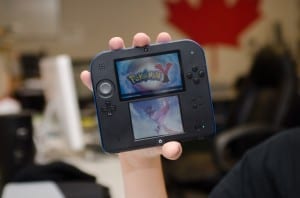Big problems and big money

Nintendo’s gaming consoles need a tune-up
Article: Taras Matkovsky – Contributor
[dropcaps round=”no”]I[/dropcaps]n gaming news, the company Nintendo has seen a decrease in its sales. The Wii U, Nintendo’s entry for the current console generation, severely failed to meet sales expectations as only 2.2 million consoles were sold out of Nintendo’s estimated 9 million. Reports of this and lower than expected 3DS sales led to Nintendo posting a $240 million loss.
On gaming sites, numerous theories and explanations as to why Nintendo is in its current state have been given. One of the most common complaints is that Nintendo does not have a good reputation with third-party developers and relies on its own brands, such as Mario and Zelda, too much.
Nintendo’s main gaming consoles are too underpowered compared to their Sony and Microsoft counterparts, unable to play games that require high resolutions.
Yet another theory is that Nintendo does not cater to the so-called “hard core” market, preferring to make kid-friendly games and ignoring gamers who like Call of Duty, Grand Theft Auto and other types of violent games. Which, if any, have merit?
On Jan. 31, I sat down with Mike, an EB Games employee in Regina. He is at the heart of gaming market action in Regina, and he ended up providing a more optimistic picture of Nintendo’s fortune.
Nintendo’s main problem with the Wii U was marketing, or lack thereof. According to him, “the fact that they added a ‘U’ at the end of Wii U threw everyone off, and the fact that they didn’t do a commercial sale on it [made people think] that the gamepad was another [Wii] controller or the system itself. It’s not; it’s the controller. People [thought] that they could use the gamepad to play on the Wii, and it didn’t work out.”
He added that more people bought Wiis than the newer Wii U’s. When it came to selling the console in stores, he said that there was a “substantial difference” between how the original Wii sold and how the Wii U sold.
On issues with third-party developers, Mike claimed that Nintendo is stronger in the children’s games area. This focus, according to him, has led the company to neglect the development of online gaming capabilities that third-parties nowadays look for.
However, he viewed this as a strength for Nintendo rather than a weakness. When asked whether Nintendo had any difficulty reaching the ‘hard-core’ gaming crowd, he said “in my store, I always find fanpeople who are associated with Nintendo willing to buy their products.”
Though things may look grim for Nintendo now, they will not be taking this sitting down. On Jan. 30, the company released an official short-term business plan. The main thrust of it was that they would still support the floundering Wii U. Top on their proposed actions list was to increase awareness for the gamepad and let consumers know just what you can do with it.
However, the company is also planning bigger things such as advertising on and creating apps for smartphone customers, improving their online gaming service, investigating new merger and acquisition opportunities and releasing a fitness-related add-on for their software.
Mike from EB rated this positively with the quip “[Nintendo] may have a lot of problems, but they have a lot of money with which to fix them.”
It seems that for now, Nintendo has some lives left in its counter. The question is, will it find more 1-Ups or run out completely?
[button style=”e.g. solid, border” size=”e.g. small, medium, big” link=”” target=””]Image: Arthur Ward[/button]










